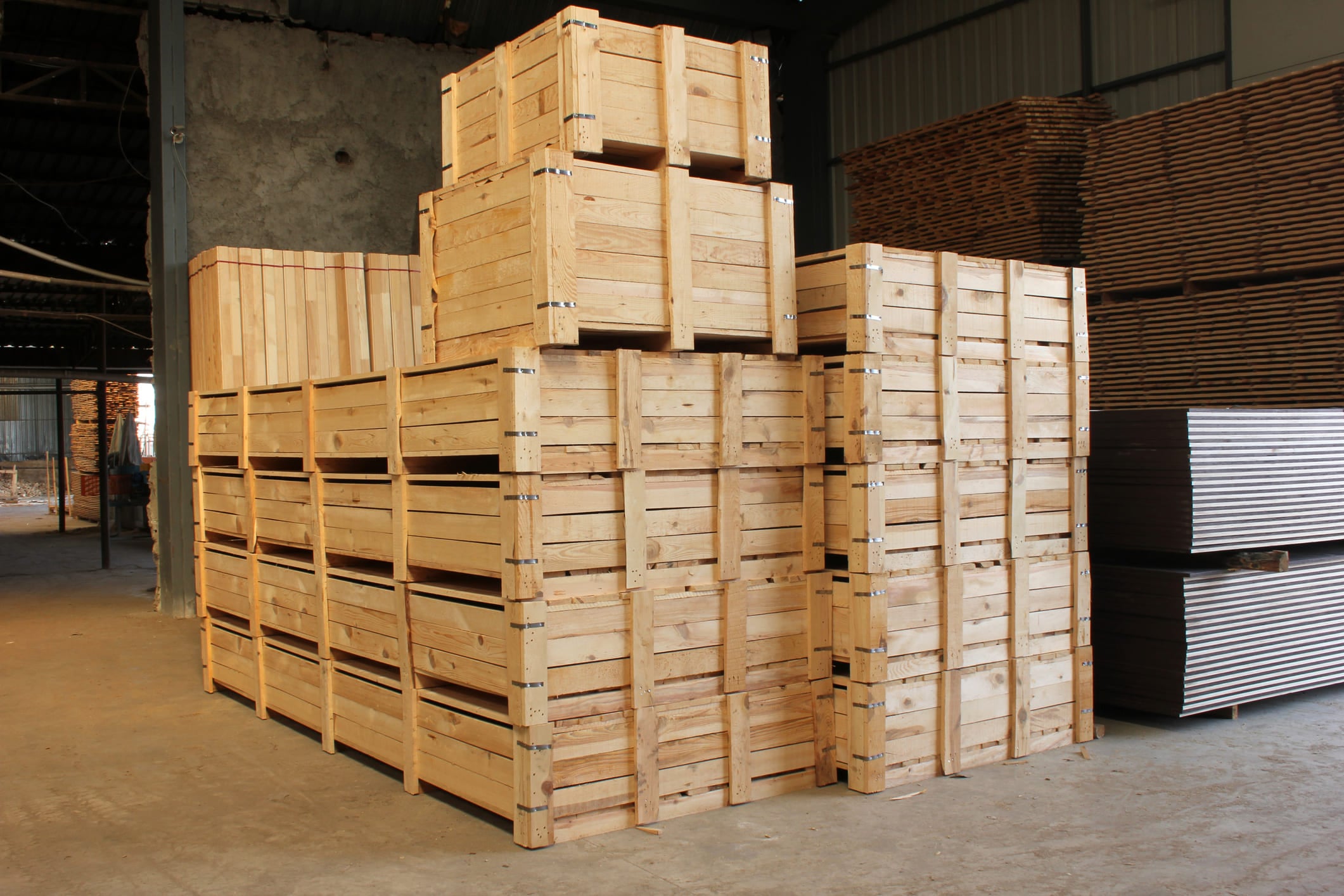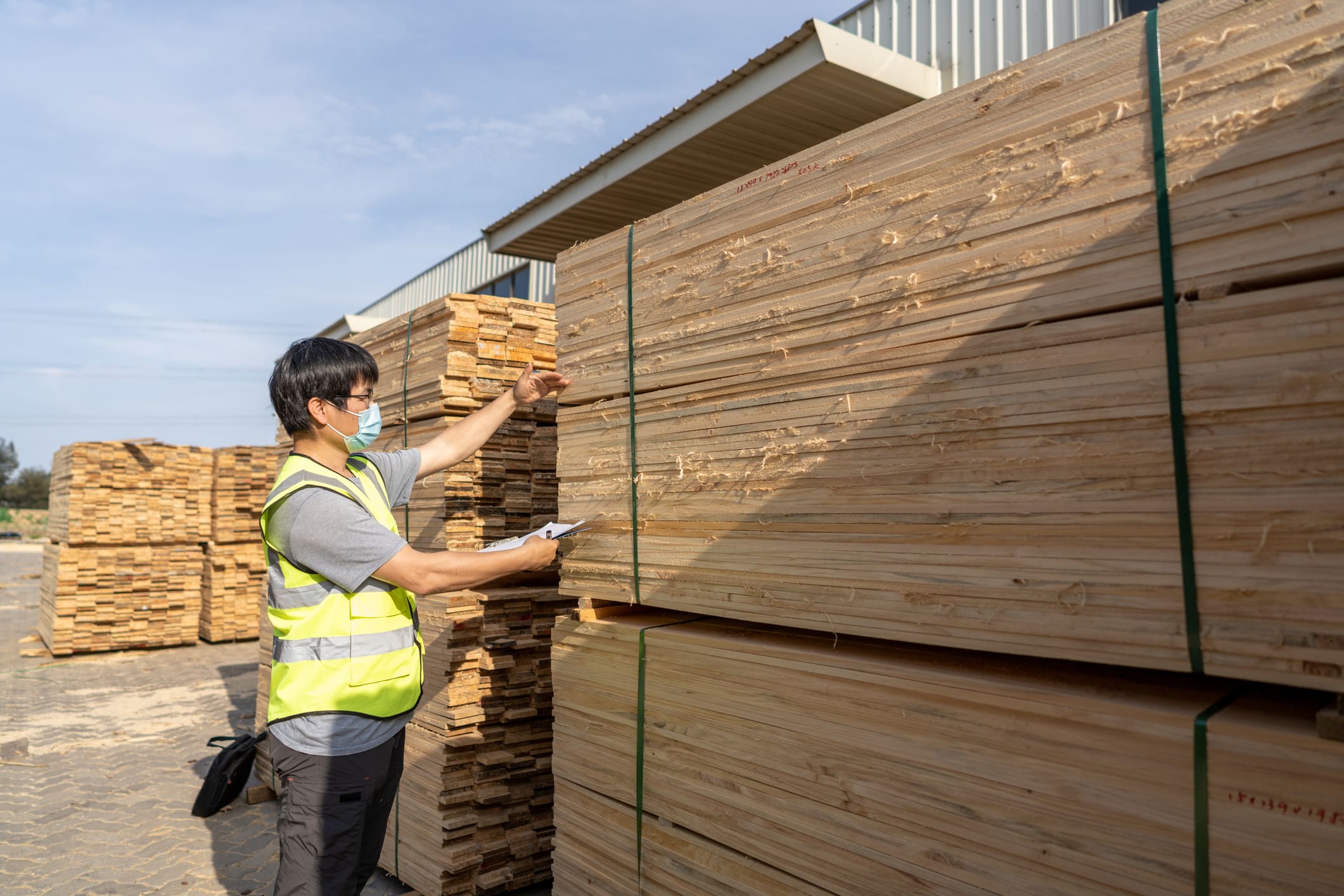Timber Crates for International Shipping: Navigating ISPM 15 Regulations
Blogs
Timber Crates for International Shipping: Navigating ISPM 15 Regulations
Understanding ISPM 15 Regulations

National Logistics Services customers often inquire about the requirements for using timber crates for international shipping. A critical aspect of these requirements involves the International Standards for Phytosanitary Measures No. 15 (ISPM 15).
These regulations, developed by the International Plant Protection Convention (IPPC), aim to prevent the global spread of plant pests and diseases. ISPM 15 rules apply to all wood packaging materials used in international shipping, including pallets, crates, dunnage, drums, and wood cases.
Compliance with these rules is mandatory for transportation companies handling overseas shipments.
ISPM 15 timber crate regulations mandate that all wood packaging used in international shipments must undergo fumigation or heat treatment to eradicate insects and fungi.
This treatment is verified through an approved stamp on the packaging, indicating compliance with ISPM 15 requirements. Timber packaging standards are crucial, as non-compliance can result in customs authorities rejecting, repackaging, or destroying shipments that do not meet these regulations.
Therefore, companies and individuals involved in international shipping need to ensure their goods are properly packed and treated according to ISPM 15 standards to avoid costly delays and penalties.
Overview of Timber Crates in International Shipping
Proper packaging is crucial for maintaining product safety and security during shipping. Despite the availability of various packaging options, many companies continue to prefer wooden crates.
Timber crates play a significant role in international shipping crate compliance and the use of sustainable shipping materials, enhancing the shipping process by ensuring the protection of goods throughout their journey.
These crates provide robust and reliable containment, making them ideal for international transport, where adherence to shipping standards and sustainability practices is essential.
Wooden crates offer exceptional strength and security, protecting products from mechanical damage during packing, loading, unloading, and transport. These crates are designed to withstand significant stress, accommodating the shipment's weight and transport shocks.
Thoughtfully constructed wooden boxes can bear heavy loads without compromising their contents' integrity. Compared to other packaging forms, like pallets, wooden crates provide superior security.
Industrial wooden shipping containers are typically hermetically sealed and secured with screws, making them more theft-resistant. Additionally, properly secured wooden crates reduce the likelihood of products tumbling off the truck during transport, unlike inadequately secured palletised goods.
The Need for ISPM 15 Compliance

Ensuring pest-free timber crates is crucial for international shipping, adhering to export timber crate guidelines like ISPM 15. This prevents the spread of invasive pests through wood packaging products, safeguarding ecosystems and promoting sustainable trade. ISPM 15 standardises the treatment of wood packaging materials, reducing the risk of pest infestation globally.
Reasons for Compliance with ISPM 15 Regulations:
- Prevention of Pest Infestation: Ensures wood packaging is treated to eliminate pests, protecting global forests.
- Adherence to Global Standards: Promotes uniform practices in treating wood packaging, and facilitating international trade.
- Protection of Ecosystems: Prevents the introduction of non-native pests that can disrupt local biodiversity.
- Reduction of Trade Barriers: Countries complying with ISPM 15 face fewer restrictions and smoother customs processes.
- Support for Sustainable Practices: Encourages responsible use and treatment of timber in international shipping.
- Regulatory Compliance: Avoids penalties and shipment rejections by meeting international phytosanitary requirements.
- Enhancement of Trade Relationships: Builds trust and cooperation among trading partners by adhering to recognised standards.
Requirements of ISPM 15 Regulations
Adhering to ISPM 15 regulations is crucial for your deliveries, as non-compliance can lead to severe consequences, including fines, loss of goods, or their destruction. Wood packaging is a common vehicle for pests, which can cause significant ecological damage when transported to new environments.
These regulations aim to protect plant health and prevent the introduction of invasive species. By meeting ISPM 15 requirements, you facilitate smoother international trade, minimising delays and reducing the risk of border rejections. Ensuring compliance helps safeguard global agriculture and maintains the integrity of cross-border shipments.
What Treatments Are Involved In ISPM 15?
ISPM 15 currently recognises two treatment measures for timber packaging materials: fumigation and heat treatment.
Fumigation
Methyl bromide fumigation, less common for wood packaging, results in timber marked 'MB'. Ideal for last-minute treatment, it suits complex or large materials unsuitable for heat treatment chambers.
Heat Treatment
The most common method used by packaging manufacturers to comply with the ISPM 15 certification process is heat-treated timber crates. The timber must be heated to a core temperature of 133°F (56°C) for 30 minutes. It is then certified as ISPM 15-compliant with the HT lumber grade stamp.
If a country adopts ISPM 15, wood packaging shipped to it must be labelled with either the IPPC MB mark or the IPPC HT mark. If a shipment without the certification mark arrives at a port, it will be held and fumigated on-site. Alternatively, it may be declined and sent back to the port of origin. In the worst-case scenario, the material could be destroyed at the shipper’s expense or buried in a landfill.
Challenges and Solutions in ISPM 15 Compliance
Timber crate manufacturers grapple with a myriad of obstacles in upholding ISPM 15 regulations, which mandate the phytosanitary treatment of wood packaging materials. Adhering to these standards presents a significant challenge due to the inherent nature of wood and its susceptibility to pests.
Consider obtaining ISPM 15 certification under the following circumstances:
- When your operations involve manufacturing solid timber pallets, wooden shipping crates, boxes, or dunnage.
- If you export wooden packaging materials to countries that have adopted ISPM 15 standards.
- When your operations need to ensure compliance with ISPM 15 regulations, thus averting quarantine issues at international ports.
Some hurdles faced by non-compliant importers include:
- Delays and Inspections: The use of non-compliant WPM can lead to delays and heightened inspections, especially if the stamps are questionable or if there are indications of potential infestations.
- Impact of Non-Compliance: Failure to adhere to WPM regulations can result in significant fines, as both the U.S. Department of Agriculture (USDA) and Customs and Border Protection (CBP) have the authority to penalise the importer of record.
- History of Compliance: Importers' past compliance records may influence the level of scrutiny they face during inspections, potentially exacerbating the consequences of non-compliance.
- Countries of Concern: Certain nations, such as Mexico, China, and Turkey, have been flagged as major areas of concern regarding non-compliant WPM, adding another layer of complexity for importers.
However, amid these challenges, innovative solutions are emerging to address the complexities of compliance. One such solution lies in the adoption of sustainable shipping materials, which not only mitigate environmental impact but also streamline adherence to ISPM 15 regulations.
Benefits of ISPM 15 Compliance

International trade relies heavily on the movement of goods worldwide, be it raw materials, finished products, or components for manufacturing. The risk of transferring pests and diseases through wooden pallet materials poses a significant threat to global trade.
Without proper regulations, the spread of pests and diseases can wreak havoc on ecosystems and agricultural industries, resulting in massive economic losses. Therefore, ISPM 15 compliance is essential in ensuring the integrity of international trade.
Advantages of adhering to ISPM 15 Regulations:
- Pest-free timber crates: Compliance ensures that wooden pallet materials are treated to eliminate or minimise the risk of pest infestation.
- Environmental Protection: Helps protect ecosystems from invasive species and maintains biodiversity.
- Agricultural Safeguarding: Prevents the spread of pests and diseases, safeguarding global agriculture and food security.
- Trade Relationship Integrity: Maintains trust and reliability in trade partnerships by adhering to international standards.
- Economic Stability: Minimises the potential for trade disruptions caused by pest-related issues.
Case Studies: Successful Implementation of ISPM 15 Regulations
Pallet Masters, an Australian pallet manufacturer, leads in international shipping crate compliance. They are a certified treatment manufacturer under the Australian Wood Packaging Certification Scheme (AWPCS). All of their export products undergo heat treatment in their on-site kiln and are clearly stamped with the internationally recognized ISPM15 mark.
Pallet Masters exemplifies effective strategies for international shipping crate compliance. Key principles include commitment, innovation, collaboration, and adherence to regulations. By emulating these practices, businesses can navigate compliance challenges seamlessly, ensuring smooth cross-border trade and environmental sustainability.
Future Trends in Timber Crate Compliance

Wooden shipping crates compliant with ISPM 15 standards are revolutionising packaging practices for businesses. They offer a blend of affordability, durability, and compliance with international shipping regulations, making them an indispensable tool in the global trade arena.
In addition, integrating digital tracking systems further enhances their utility, allowing businesses to monitor their shipments with precision. This article delves into the multiple facets of these crates, emphasising why they are an ideal choice for your business.
- Achieving Quality on a Budget: Finding the Right Balance between Price and Performance.
- Insight: Striking a balance between affordability and performance ensures value for money without compromising quality.
- Trusting in Transit Reliability: The Importance of ISPM 15 Compliant Crates.
Insight: ISPM 15 compliant crates provide assurance in transit reliability, adhering to international standards for safe shipment. - Tailored Solutions: Crafting Crates to Suit Your Specific Needs.
Insight: Custom solutions offer flexibility, catering to individual requirements and ensuring optimal functionality. - Enduring Strength: Exploring the Longevity of Wooden Crates.
Insight: Wooden crates boast enduring strength, standing the test of time and maintaining structural integrity.
Why Wooden Crates Will Shape Shipping's Future?
Opting for ISPM 15-compliant timber shipping crates proves strategic for companies aiming to streamline their shipping processes. These crates present an ideal blend of affordability, dependability, tailorability, durability, and eco-friendliness. Embracing these crates signifies not just a prudent financial move but also a commitment to fostering a greener and more conscientious global trade network.
Conclusion
In conclusion, navigating ISPM 15 regulations is vital for timber crates for international shipping, ensuring compliance with global timber crate requirements. Adherence to these standards prevents pest spread and maintains ecological balance, essential for seamless trade. Neglecting ISPM 15 risks delays, fines, and credibility loss in the global market.
Understanding and adhering to these regulations is paramount for exporters, safeguarding the integrity of timber crates in international shipping. Recognising ISPM 15's significance fosters reliability and trust, facilitating smoother cross-border transactions. Prioritising compliance demonstrates a commitment to sustainability and regulatory adherence, fortifying competitiveness and fostering enduring partnerships in international trade.




